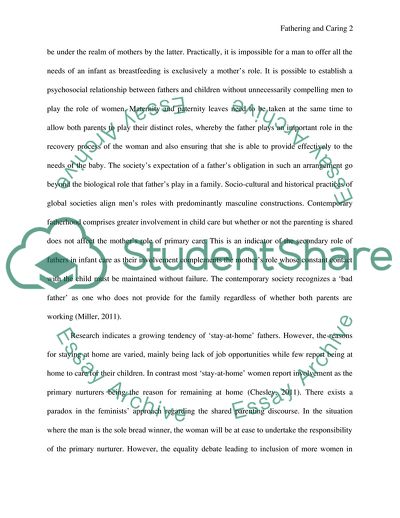Cite this document
(Fathering and Caring Essay Example | Topics and Well Written Essays - 1750 words, n.d.)
Fathering and Caring Essay Example | Topics and Well Written Essays - 1750 words. https://studentshare.org/sociology/1869985-vuori-2009-notes-that-experts-view-motherhood-as-a-societal-duty-and-fatherhood-as-personal-and-elective-200945-consider-this-statement-in-the-context-of-contemporary-fatherhood
Fathering and Caring Essay Example | Topics and Well Written Essays - 1750 words. https://studentshare.org/sociology/1869985-vuori-2009-notes-that-experts-view-motherhood-as-a-societal-duty-and-fatherhood-as-personal-and-elective-200945-consider-this-statement-in-the-context-of-contemporary-fatherhood
(Fathering and Caring Essay Example | Topics and Well Written Essays - 1750 Words)
Fathering and Caring Essay Example | Topics and Well Written Essays - 1750 Words. https://studentshare.org/sociology/1869985-vuori-2009-notes-that-experts-view-motherhood-as-a-societal-duty-and-fatherhood-as-personal-and-elective-200945-consider-this-statement-in-the-context-of-contemporary-fatherhood.
Fathering and Caring Essay Example | Topics and Well Written Essays - 1750 Words. https://studentshare.org/sociology/1869985-vuori-2009-notes-that-experts-view-motherhood-as-a-societal-duty-and-fatherhood-as-personal-and-elective-200945-consider-this-statement-in-the-context-of-contemporary-fatherhood.
“Fathering and Caring Essay Example | Topics and Well Written Essays - 1750 Words”. https://studentshare.org/sociology/1869985-vuori-2009-notes-that-experts-view-motherhood-as-a-societal-duty-and-fatherhood-as-personal-and-elective-200945-consider-this-statement-in-the-context-of-contemporary-fatherhood.


